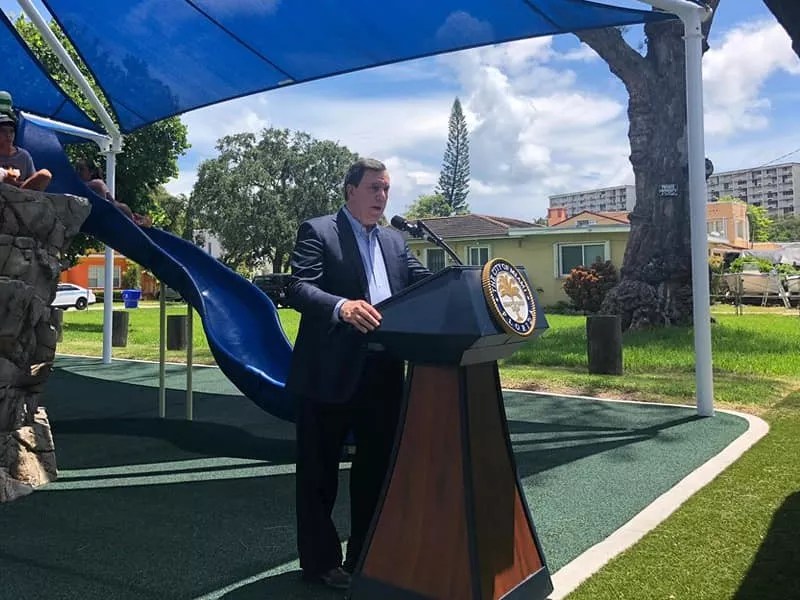
Photo by Commissioner Joe Carollo / Facebook

Audio By Carbonatix
Update, May 27: Florida’s Third District Court of Appeal today upheld a Miami-Dade circuit court judge’s order requiring that City of Miami clerk Todd Hannon turn over all recall petitions to the Supervisor of Elections.
The effort to recall Miami Commissioner Joe Carollo hangs by a thread. Yesterday afternoon, the City of Miami rejected petitions signed by more than 1,900 registered voters in Carollo’s District 3 on the grounds they were submitted past the deadline.
The city’s decision, which effectively kneecaps the recall campaign, has roiled organizers with Take Back Our City, a political committee organizing the recall effort. The group last night filed a lawsuit against the city and City Clerk Todd Hannon. Among other things, the lawsuit accuses Hannon of overstepping his bounds as city clerk when making a determination about the timeliness of the petitions’ submission.
Because the City of Miami does not have its own provision for recalls, city officials and organizers have been proceeding by – and strongly disagreeing about – state law on recall campaigns. The procedural arguments center on a state statute that requires recall organizers to collect signatures from at least 5 percent of registered voters during a 30-day window before moving on to the next phase of the recall process.
The Carollo recall required 1,577 initial signatures. According to attorney Juan-Carlos “J.C.” Planas, the petition received its first signature January 31, which means the 30th day would have been this past Sunday.
Despite that fact, Planas says, he received a call Friday from Hannon that suggested City Attorney Victoria Méndez had decided Saturday would be the last day for the campaign to submit signatures. In an attempt to comply, Take Back Our City on Saturday scanned and electronically submitted all 1,941 of its signatures to Hannon’s office, which was closed Sunday. Yesterday morning, organizers went in person to turn in physical copies of the petitions. According to Take Back Our City’s lawsuit, Hannon accepted the petitions and said he would scan and date-stamp them before handing them over to the county elections supervisor. But that never happened.
New Times reached out to Hannon and Méndez for comment by phone and email but has not received any response.
The suit from Take Back Our City argues that state law does not allow Hannon to make any judgment as to whether the petitions are invalid or untimely. Planas and others believe the city attorney’s office helped create the legal argument for rejecting the petitions.
“The city attorney is supposed to represent the city and the residents, not the commissioners,” Planas says. “This was a predetermined outcome decided by a city attorney hoping to protect a commissioner who has a say over her job. It’s a total abuse of power.”
This morning, Take Back Our City filed for an emergency injunction asking the court to preserve the petitions, which remain at the city clerk’s office. In a letter sent yesterday afternoon, Hannon told organizers the petitions could be picked up when convenient. But Planas says that’s a trap: “The petitions would be voided the moment we retrieved them.”
If Hannon had passed the petitions on to Miami-Dade’s elections department, the next step in the recall process would have involved an elections supervisor verifying at least 1,577 of the signatures. Next, Carollo would have been offered the chance to write a 200-word defense, which would be printed on petitions put before District 3 voters during the second round of signature gathering. During that second round, organizers would have 60 days to collect roughly 4,700 signatures. If completed and verified, Carollo would then either have to step down or run for office again in a recall election.
In the background of the ongoing recall effort against Carollo, he and two other Miami commissioners – Alex Diaz de la Portilla and Manolo Reyes – voted to pass a controversial ordinance that would limit the number of times a commissioner can be targeted by recall efforts to once per year. If that measure had been in effect before this recent recall effort against Carollo began, the city’s rejection of recall petitions could have ensured the polarizing commissioner would be protected from a similar public challenge until 2021.
The ordinance still needs a second reading before it goes to the desk of Miami Mayor Francis Suarez. Commissioners have defended the measure by arguing it has nothing to do with the current campaign against Carollo.